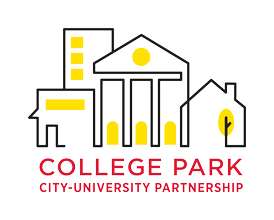College Park: Linking, Living, and Learning
Over the last decade, the Partnership has created programs to help make homeownership in College Park more affordable. Through our Homeownership Program, we have helped 80 home buyers purchase homes so that they can live and work in College Park. With the launch of the Community Preservation Trust we created a program that increases homeownership affordability and provides opportunities for homebuyers to put down roots, strengthen neighborhoods, and cultivate household economic assets in the D.C. region’s increasingly expensive housing market. We have seen the difference these programs make in our neighborhoods and the lives of our neighbors! We are proud of our work, and eager to expand housing opportunities in the city for years to come. As we work to advance the ambitious goals outlined in the University-Community Vision 2030, we also have been challenging ourselves to go further as we look to implement our shared Vision 2030:
The Challenge: How can the strength of our housing programs support and expand the reach of the Partnership’s work in other priority areas beyond housing? For instance, how can housing help us advance k-12 educational outcomes in College Park?
How does housing relate to education? One question posed often by prospective homebuyers is: “How are the schools?” Potential purchasers considering College Park are no different. Housing decisions are often tied closely to educational planning, because where you live often determines where you go to school. School district enrollment policies vary across districts but are often based on a student’s place of residence. With local property taxes providing a significant source of school funding, the impacts of geography on home values and education are, in many cases, inextricably linked.
What is the impact of housing on students and families? Housing can have a significant impact on residents’ employment opportunities, household and financial stability, and mental and physical health. When focusing on housing’s impact on education, demographic studies demonstrate children living in unstable, unaffordable housing often perform less well in school and have more limited access to out-of-school time enrichment activities. Household stress – due to unsafe conditions and financial or employment instability – can negatively impact students’ educational performance. Neighborhood stressors – such as crime and environmental pollution – can further heighten stress levels and impede both students’ school performance and out-of-school engagement. For families stretching to afford the cost of living in the D.C. region, housing affordability can directly contribute to household and financial instability, which in turn can negatively impact their children’s educational outcomes. As a result, K-12 educational outcomes directly link to a student’s higher education and employment opportunities into the future. A family’s housing and education decisions are deeply intertwined, with long-term implications related to family asset building assets and longer-term economic mobility.
The College Park City-University Partnership has a long history of supporting K-12 education and access to homeownership in College Park. Most notably, in 2013, it sponsored the creation and launch of College Park Academy, a college-preparatory public charter school serving middle and high school students, and the launch of Monarch Preschool College Park in 2016 as part of its overall efforts to support public education in College Park and Prince George’s County. Through our expanding portfolio of housing programs, we are making homeownership more affordable and attainable for local families who are eager to live in College Park and contribute positively to neighborhood life. We lead active cross-sector committees that are working to advance housing, neighborhood and educational opportunities in College Park. The challenge before us is to build on our strong programmatic foundations in housing and education access to strengthen College Park as a place to live and learn for all families.
